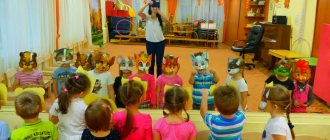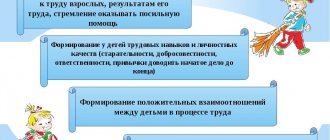Raising a child by mother
Mom is the first and most important person in a child’s life. The mother’s participation in raising a child is enormous, because from the moment of conception and many months after birth they are one. The mother is the child’s whole world, because she is the one who provides comfortable conditions for his growth and development, feeds him and cares for him. But she should not only praise, teach and love. Raising a child by a mother also presupposes the ability to punish, explaining what is good and what is bad.
Punishment for disobedience or misconduct is as much a part of education as encouragement. Only a mixed approach to education, the ability to correctly combine kindness, love and severity can be successful. From an early age, the baby must understand what a big role his mother has in his life, so it is necessary to instill in his mind a number of values, including respect for her. At the same time, the importance of raising a child by a mother does not decrease with age. No one except a loving mother can tell you whether a little person is doing right or wrong. She understands, feels and sees better than anyone else what her child needs, guiding him on the right path in life and helping him make the right choice.
Rate this article: 4.75 4.8 out of 5 (8 votes)
Raising a child by dad
A child in a family needs both female and male attention. The father's functional responsibilities in the family include financial support, responsibility, fidelity and reliability. A man must be able to do a lot technically, understand his wife and child, be able to prevent conflict situations, imagine how to prepare the child for the future life, quietly guiding him along the path of life.
The participation of the father in raising the child is of utmost importance for his development from the very moment of birth. Dad, like mom, becomes a source of emotional confidence for the baby. Raising a child by a father is aimed at developing courage, determination, honor and dignity. For a baby, dad is not just a loved one, he is an example of a man, a symbol of masculinity and masculinity.
Dad's participation in raising a child helps to form a masculine attitude towards the world through personal example and actions, which is especially important for boys. The son needs his father's company, his support and love. This is how the boy begins to feel and behave like a man. Therefore, it is useful for the son and father to remain alone at home, without the protection and interference of the mother, to go for walks together and have their own common secrets.
Raising a child by a father is also important for a girl, since his approval gives her self-confidence. The father becomes an example of parental behavior for children in the future; his love ensures the formation of a person’s life position and position in society.
Parents' committee in kindergarten: advice from "experienced"
When sending a child to kindergarten, parents have the right not only to learn about his relationships in the team, to be interested in academic success, but also to take an active part in the life of the kindergarten.
Anyone who wants to raise a self-sufficient and harmoniously developed personality, a loving and understanding child, will always find the opportunity to participate in an important stage of his life for the child - the kindergarten period.
In order for parents to be not just observers of the educational process, but also its participants, a parent committee is created. It is designed to resolve issues at various levels with the administration of the preschool institution, as well as with other organizations that provide and monitor the work of the kindergarten. In this case, a parent committee can be created in each group, and a general committee is also formed for the entire preschool institution. The main task of the parent committee is to help teachers create optimal conditions for the presence and development of children within the walls of the kindergarten.
The main responsibilities of the parent committee are:
- Organize and hold unscheduled meetings in the garden to resolve important issues;
- Solve financial issues, raise funds for the needs of the group;
- Assist in organizing repairs in the group and on the general kindergarten territory;
- Organize and purchase gifts for the holidays;
- Participate in organizing events and celebrations;
- The parent committee has the right to influence the activities of the teacher, recommending certain types of work;
- The parent committee has the right to request from the administration of the institution a report on the distribution of kindergarten money;
- They control the work of all employees of the institution and have the right to report detected violations to the relevant structures.
You can become a member of the parent committee only on a voluntary basis. The activities carried out by the committee are quite complex and responsible, and are not suitable for everyone and are not of interest to everyone. If you don't have the desire, don't force yourself to become a member of the parent committee. If possible, you can always offer your help to an already organized group of parents, for example, bring or take away something, etc.
The parent committee is elected by voting at the first parent meeting at the beginning of the school year. As a rule, there are always 3-5 self-nominated people who have enough free time and desire to help teachers organize comfortable conditions for children to stay in kindergarten.
Among them, a committee chairman is nominated who will represent the interests of the group at all general meetings of the garden and before the administration. It is he who conveys to the entire group of parents the information received at the general kindergarten meeting.
The work of the parent committee: an inside view
Meetings of the parent committee take place much more often than parent meetings and are coordinated with the kindergarten administration. But since the committee includes the most active and sociable mothers, they immediately establish contact with each other and meet to resolve issues even more often than scheduled meetings.
In order to organize its activities more clearly, all responsibilities are distributed among committee members.
- Thus, one of the parents communicates with the administration of the preschool institution on pressing issues. He is almost always the chairman of the committee.
- Responsible for financial matters and fundraising.
- The third establishes and maintains contact with other parents.
- The fourth member of the parent committee deals with repairs and other economic issues.
- The fifth parent organizes gifts and actively helps the teacher in organizing children's holidays and birthdays;
The distribution can be arbitrary, depending on the desire and choice of the committee members themselves. In any case, it is recommended to select one person within the committee who will be on hand. This is the person through whom educators will communicate their needs (if you need to draw a poster, print handouts, or what to buy for the group).
Despite the fact that responsibilities are divided between members of the parent committee, all issues are still voiced and discussed collectively, which is necessary to control the intended use of common money. This is the main principle of the committee's work.
For better contact with parents, it is most convenient to create a group in instant messengers (Whats up and Viber) or social networks, where all participants will be invited. This way you can get the information across even to parents who do not attend group meetings.
Financial questions
The main problem of parent committees is raising money. This is the most time-consuming and thankless job. Of course, financial assistance to a preschool institution is voluntary. Not every parent will be happy to give up their money. But the task of the parent committee is to competently justify what and how much money is required. The amount of money collected will depend on how correctly and clearly they convey this need to other parents.
To be honest, not a single kindergarten can do without “voluntary” donations. Funds are needed for gifts for children, for the needs of the group (from toilet paper to office supplies), money has to be collected for theaters and museums.
It is best to calculate and draw up a preliminary estimate for the whole year, and then justify at the parent meeting why it is more convenient to collect such an amount of money at once. You won’t have to catch your parents every time to collect a “voluntary donation” for March 8, February 23, the purchase of stationery, etc., you won’t have to worry about late money, this way you will protect yourself from investing your “hard-earned money” for some reason. then the other parent.
Keep in mind that any parent who has made a contribution to the “common fund” has the right to check the work of the parent committee.
Important:
It is more convenient to keep all the collected money with one person - this will eliminate confusion. To save your nerves at the end of the year, we strongly advise you to keep track of your expenses. Be sure to keep receipts for any purchase, even the smallest one. They will be needed for subsequent reporting to parents about the funds spent.
How to organize everything
First, you need to find out about all the needs of the group: household goods, office supplies, etc. Usually, educators themselves convey such information to the parent committee, but you can play it safe. Based on this, you will decide how much money you need to raise. It is better to ask the teacher to provide you with the entire list of required purchases, indicating their urgency. This way you can pre-plan what to spend the collected funds on first.
Holidays and gifts in the garden
Most of the money collected always goes to purchasing gifts for various holidays: New Year, March 8, February 23, as well as birthdays and graduations. You can discuss and choose gifts at a parent meeting, as well as in a group in messengers. It is important to discuss and agree on a common opinion in advance, and also to clarify whether there are any other parents who want to help the parent committee. Parents of the group can offer you their help: take you to the base to buy gifts, help bring all the gifts to the kindergarten, package candy, etc. But, as practice shows, all issues related to purchasing gifts for children and group teachers have to be resolved independently.
Among the parents in the group, there are always a couple of three who refuse to give money for a gift to their son (daughter). The reasons may be different, and you do not have the right to demand financial investments from them. The only thing you should do is warn parents so that they take care of the gift for their children themselves, so as not to spoil the child’s holiday experience.
What should you be prepared for when becoming a member of the parent committee?
- You will definitely be discussed and judged. Just be prepared for it. It's hard to please everyone, so just try to do your job conscientiously and don't worry if one of your parents didn't like the New Year's gift you bought.
- You will have to constantly seek a compromise between the needs of the garden and the capabilities of the parents. Therefore, learn to politely refuse the teacher’s request, with the support of your parents.
- They will constantly write and call you about various current and “ridiculous” issues.
- You will spend quite a lot of personal time solving group and garden issues.
- You will often be in the role of a loader, since the parent committee will have to deal with the purchase of office supplies, household goods, gifts for children and teachers.
- You will have to do a lot of creative work: draw posters, decorate the halls, come up with scripts, etc.
Despite all of the above, there is no need to be afraid of working in the parent committee.
Be patient. This work is labor-intensive and thankless, but it brings a lot of benefits. By becoming a member of the parent committee, you have a direct opportunity to provide your child with the best conditions for development, education and the formation of a self-sufficient personality. Return to section
Currently, preschool teachers are actively using the full pedagogical potential of traditional forms of interaction with the family and are looking for new, non-traditional forms of cooperation with parents in accordance with the changing socio-political and economic conditions of the development of our country.
Raising children is inextricably linked with the pedagogical education of parents. Which includes the systematic active dissemination of pedagogical knowledge among parents, the provision of practical assistance to families in raising children, improving the pedagogical culture of parents and intensifying their pedagogical education.
In accordance with the Federal State Educational Standard, a kindergarten is obliged to:
- inform parents (legal representatives) and the public regarding the goals of preschool education, common to the entire educational space of the Russian Federation, as well as about the Program, and not only to the family, but also to all interested parties involved in educational activities;
- ensure openness of preschool education;
- create conditions for the participation of parents (legal representatives) in educational activities;
- parents (legal representatives) in raising children, protecting and strengthening their health;
- ensure the involvement of families directly in educational activities, including through the creation of educational projects together with the family based on identifying needs and supporting the educational initiatives of the family;
- create conditions for adult representatives) of children on issues related to the implementation of the program.[3]
The task of a teacher who directly observes children and knows their problems is to attract parents to cooperation, to knowledge and understanding of pedagogical principles. It is important to activate and enrich the educational skills of parents, maintain their confidence in their own pedagogical abilities, and spread the positive experience of education in the family: spending family leisure time, following family traditions, etc. [1]
Our kindergarten today is in development mode, quickly responding to changes in the social composition of parents, their educational needs and educational requests. Depending on this, we change the forms and directions of work of the kindergarten with the family. We begin our work with an analysis of the social composition of parents, their mood and expectations from the child’s stay in kindergarten; surveys and personal conversations on this topic help to organize the work correctly, make it effective, and select interesting forms of interaction with the family.
In order for the kindergarten to become a source of information about the child and the development of parent-child relationships, we offer various forms:
- "Round table" on any topic;
- thematic exhibitions;
- social survey, diagnostics, tests, surveys on any topic;
- specialist consultations;
- family sports meetings;
- helpline mail, helpline;
- open classes for parents to watch;
- family talent competition;
- Open Day;
- DOW website.
The main form of cooperation with parents is parent meetings, which include the entire complex of the psychologist - the pedagogical influence of the kindergarten and the family. However, parents are reluctant to respond to mediocre and formal meetings in the form of reports and instructive conversations, which is quite understandable. We see a way out of this situation by changing the forms and methods of holding parent meetings, which in our kindergarten take place in the form of discussions, using active methods that can maintain a lively conversation for a long time. These include presentations about the life of children in kindergarten, puzzling questions about “spicy dishes,” moments of introspection when every parent thinks about their relationship with their child.[2]
One of the interesting and effective forms of interaction is the publication of a newspaper for parents “Rainbow Rays”, which is published in our preschool educational institution and is published quarterly. This is both a way to educate the family and inform about the life of the kindergarten, as well as a means of developing the creative abilities of teachers and children. Not only teachers, but also children from the preparatory group take part in the design of the newspaper. The newspaper, as a form of interaction with the family, is also relevant because the element of “coercion” disappears here, which psychologists talk about with alarm, emphasizing that it is this that pushes parents away and interferes with the perception of interesting and significant information. Information about what kind of intensive work is carried out with preschoolers in kindergarten changes the attitude of parents towards teachers and, in general, towards the work of preschool educational institutions. Often parents do not see the amount of work that is being done with their children. Many, especially in early age groups, are only interested in what and how their child ate, whether he slept well, and the teacher does not always have the opportunity to advise and answer parents’ questions, because children cannot be left unattended. Parents often don’t have time to read the information stands that are in each group, but you can take the newspaper with you and read it at home in a calm environment.
A family club “We are together” was created at the preschool educational institution, which parents have been actively visiting for several years. The goal of the club: to create cooperation in each group that is diverse in content, promoting the development of constructive interaction between teachers and parents with children. During the work of the club, entertainment, family competitions, master classes are held, parents share their problems, family experiences, and health recipes. Family club classes are held once a month. All parents or family members, as well as guests, are invited to participate in the work of the club, i.e. attracted specialists in accordance with previously identified requests.
Together with my parents, a mini-museum was organized for the 70th anniversary of Victory in the Great Patriotic War. This form of work helps to foster patriotic feelings and systematize previously acquired knowledge in children.
“Open Day at a preschool educational institution” is one of the forms of working with parents, which provides them with the opportunity to get acquainted with the educational institution, its traditions, rules, and objectives of the educational process. Kindergarten gives adults the opportunity to “live” a day in kindergarten, feel the atmosphere of children’s life, and see the work of teachers. During this day, they can visit various types of joint activities between teachers and children, get acquainted with the organization and content of routine moments.
One of the forms of interaction between preschool educational institutions and parents is “My Family” day. On this day, parents of different professions (seamstress, driver, doctor, librarian, policeman, military, hairdresser, etc.) come to visit preschoolers and introduce the pupils to the features of their profession. Also in our preschool educational institution there is a day of “Good Deeds”, which is held once a month, parents are involved in cleanup days, to participate in landscaping the territory of the preschool educational institution, in the winter season: building slides and snow figures.
Joint thematic exhibitions of crafts and drawings of children and parents are regularly held in the kindergarten. We reward all families who take part with thanks and diplomas at the group level, and the most active families who take part not only at the kindergarten level, but also at the city level are awarded with certificates and gifts from the kindergarten.
Currently, the project method is actively used, when parents are involved in completing a certain part of the overall task, for example, introducing preschoolers to their hometown. They collect information about architecture, names of streets, squares, take photographs, etc. Then they present their work at a general event (meeting, meeting of the “We Are Together” club), the best projects are published in the newspaper of the preschool educational institution. This method helps bring parents, children and teachers closer together.
One of the most favorite types of joint activities is the participation of parents in holidays. Live communication with mom or dad brings special pleasure to children, and parents, immersing themselves in the world of a children's party, better understand their children, their desires and interests.
All information about events held in the kindergarten is posted on the kindergarten’s website and supported by photographs (consents have been signed with all parents to post photographs of children). On the website of the preschool educational institution, any parent has the opportunity to get acquainted with the features of the educational process in the preschool educational institution, find out the latest news and thus always be aware of all the events taking place in the kindergarten. Kindergarten e-mail is used to work with written messages from parents, establishing dynamic and effective feedback in the work of the kindergarten with the family; it does not replace communication, but serves as a good reason to make it productive, understandable and rich.
With such an integrated approach, parents become the most active helpers and faithful companions of teachers in any endeavor.
Using various forms of work with families of kindergarten students gives positive results. With all their work, preschool employees prove to parents that their involvement in teaching activities, interested participation in the educational process is important not because the teacher wants it, but because it is necessary for the development of their own child.
Literature
- Zvereva O. L., Krotova T. V. Communication between a teacher and parents in a preschool educational institution: Methodological aspect. – M.: TC Sfera, 2005. – 80 p.
- Metenova N. M. Parent meetings in kindergarten. 2nd junior group. – M.: “Publishing house Scriptorium 2003”, 2008. – 104 p.




